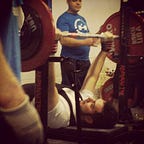Shocktroopers : Prologue
One of my longest dreams has been to write a novel. I’ve started researching and writing for two different stories that mean a lot to me but I’ve struggled to make regular progress on them.
As a means o challenge myself, I’d like to take the jump in committing a project by publishing the story here on MEDIUM as I write it. In this way, it’ll actually end up being a series of short stories.
I can’t always promise that the continuity will be perfect (as with historical fiction, and writing in general, ideas come for different parts of the story at a time) but I hope it gives you some entertainment. Also, as this is historical FICTION, certain liberties have been taken, of which I’ll try and include some level of explanation for. Any criticism is much appreciated.
________________________________________________________________
Trench Poets
BY EDGELL RICKWORD
I knew a man, he was my chum,
but he grew blacker every day,
and would not brush the flies away,
nor blanch however fierce the hum
of passing shells; I used to read,
to rouse him, random things from Donne —
like “Get with child a mandrake-root.”
But you can tell he was far gone,
for he lay gaping, mackerel-eyed,
and stiff, and senseless as a post
even when that old poet cried
“I long to talk with some old lover’s ghost.”
I tried the Elegies one day,
But he, because he heard me say:
“What needst thou have no more covering than a man?”
grinned nastily, and so I knew
the worms had got his brains at last.
There was one thing that I might do
to starve the worms; I racked my head
for healthy things and quoted Maud.
His grin got worse and I could see
he sneered at passion’s purity.
He stank so badly, though we were great chums
I had to leave him; then rats ate his thumbs.
The downpour of rain was inundating. The French battlefield remained a puddle. The darkness of midnight plunged thunderbolts in a frightening array. Rain bombarded through the night while mortars, grenades , and artillery shells took over the task in the day.
Sending more and more souls to oblivion in the wretched war of 1914. A year in, Ferdinand’s death plunged most of the world into total war. Millions had been mobilized to protect empire, all in the name of alliances.
Many had died.
Like sheep, they had been forced to march into incoming artillery fire; tactics that had worked well enough for hundreds of years but left nothing but slaughter in this war. Not a hundred years earlier, in Napoleans’ day, he boasted that he would go through 30,000 men in a month.
He boasted because his forces could be easily replenished as everyone was conscripted to fight. This war of the new age, was as if everyone had Napoleon’s resources.
It was why they would be later known as a lost generation.
Horses, squadrons of the mighty Hussars, who had only in the past century, been a mighty bastion of cavalry were now cut down by the cutting edge of artillery fire. Machine guns, mustard gas, and artillery pieces the size of Giant pumpkins.
The bleeding edge of war.
And it was a stalemate.
Barbed wire raised, trenches dug, cohorts of rats and lice waging guerrilla warfare on both sides, this was the Great War.Taking on such a war was perplexing to commanders on both sides. There seemed no way to get around this war of attrition.
That is until one night, four Gurkhas, Tibetan-Indian men under British mandate, crept through enemy lines under shadow of night. Knives and grenades. These men braved where others slumped under protection of their trenches.The Gurkhas crept in the middle of the Norman field at night to their post on the fake tree. Just four soldiers.
Travelling through the cloak of the night, the various craters from artillery fire allowed them cover through No Man’s Land. Their feet clothed in wool to mitigate noise, they worked their way into the more populated areas in the enemy’s trench line.
The grenade melee commenced as the Germans took casualties by the surprise. The Gurkhas quickly ran out of the trench as machine gun fire emptied upon them.
The Gurkhas wreaked havoc on their raid, returning home within half an hour as sirens began to sound. Machine gun fire tailed them as they ducked over the mounds of sand bags into their mud-hole-trenches. Basking in sweat, the troopers heaved in air, adrenaline still pumping through their veins.
In the huddle of busy men firing counter-machine gun fire from a nearby post, came the sound of marching men. It was the commanding officer. The Gurkha’s stood to attention as the two in-charge of the raid moved with the their commanding officer to his officer’s dugout.
Under the dim light of a candle-torch, the mud-sodden Gurkha men saluted their commander and explained their success. “Well then. Our little experiment went better than expected.” The Officer smirked.
“Yes, sir. We were able to effectively surprise the enemy and do reasonable damage with the objective given to us.” The sergeant, or Havildar of the Gurkha group replied.
“This is mighty promising, sergeant. It might change this messy slaughter that we’ve found ourselves here.” The officer said.
“I hope so sir. I sure hope so.”
